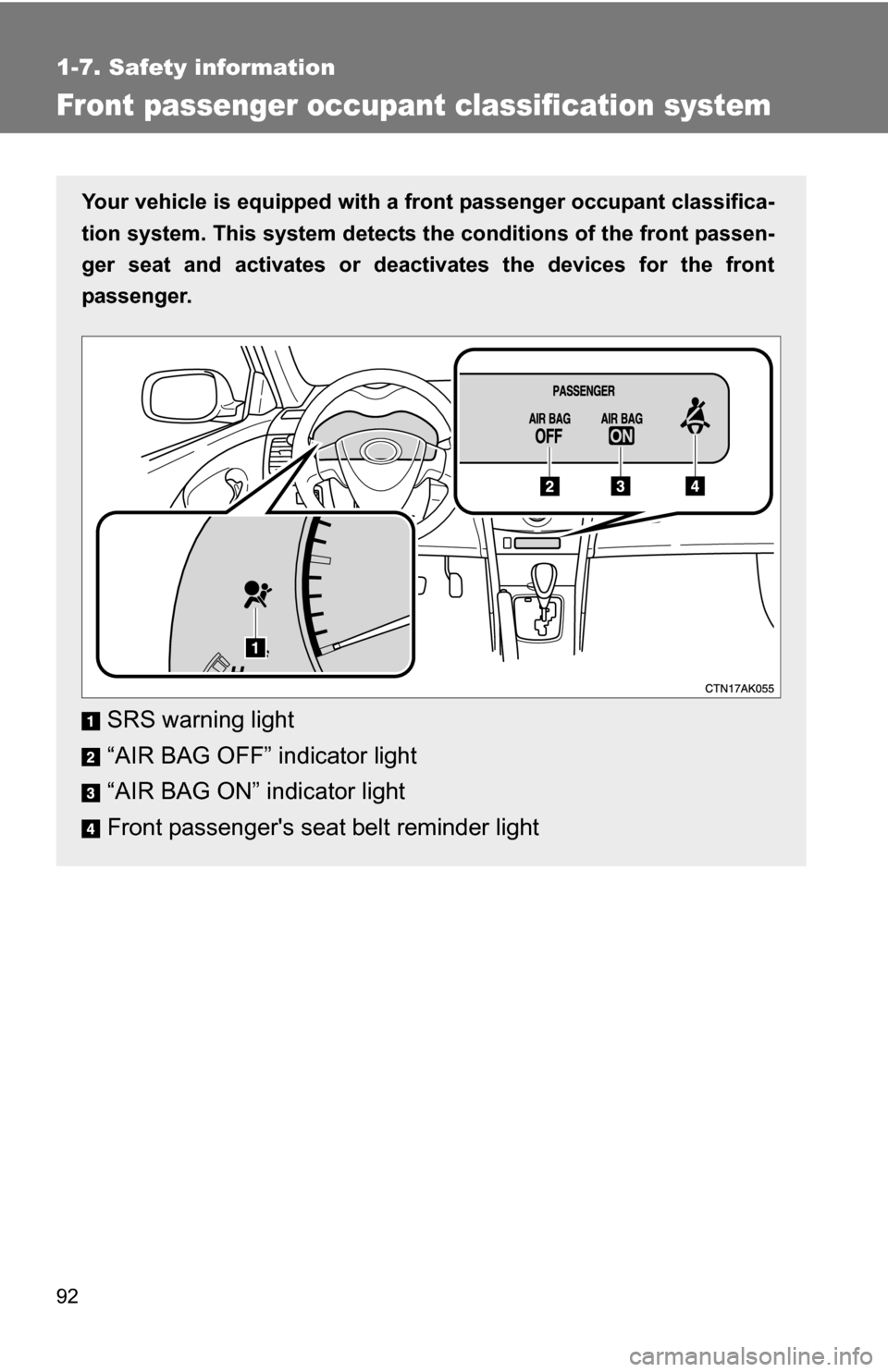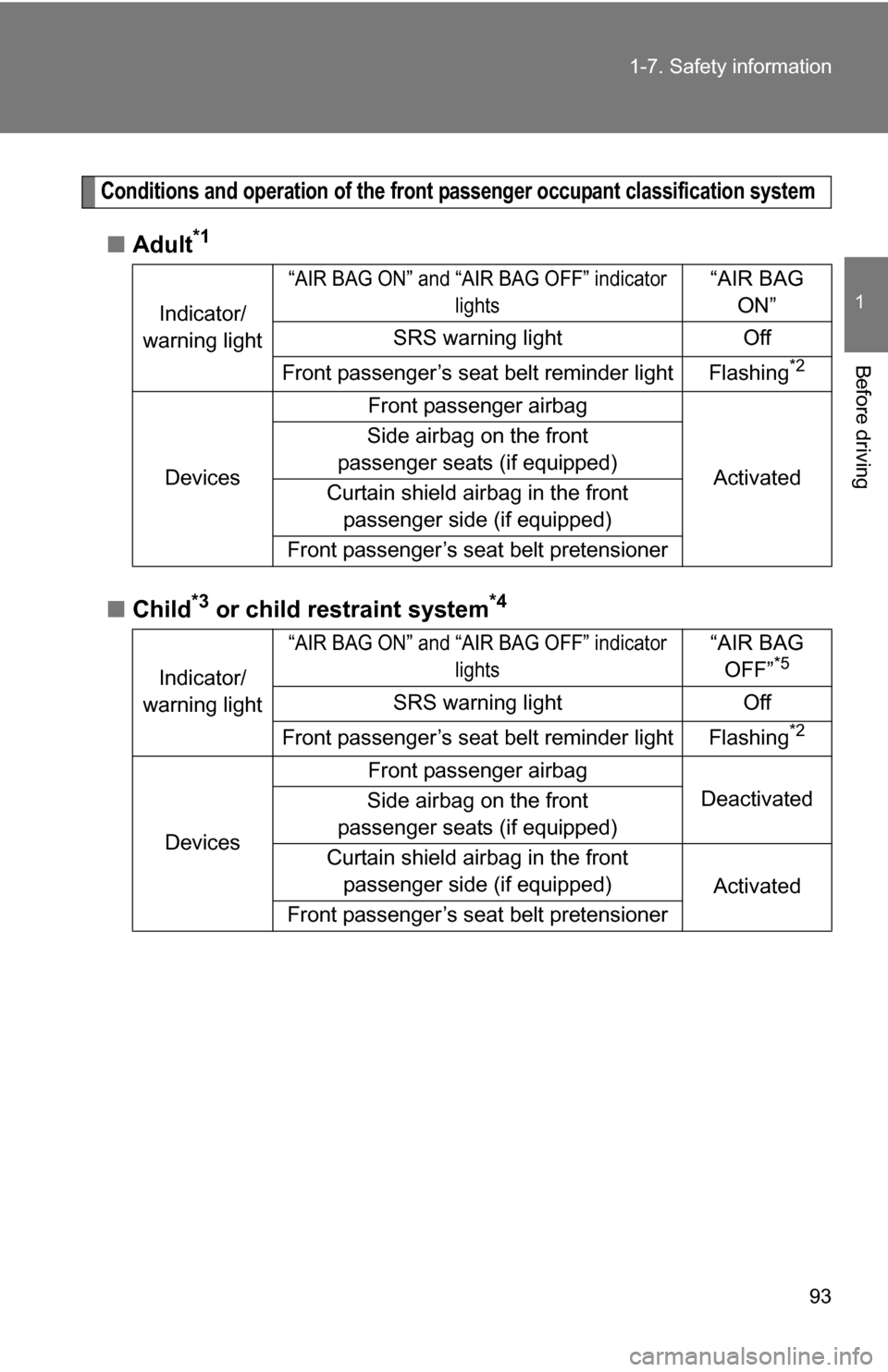2009 TOYOTA COROLLA warning light
[x] Cancel search: warning lightPage 2 of 468

TABLE OF CONTENTSIndex
2
1-1. Key information .................. 20Keys ..................................... 20
1-2. Opening, closing and
locking the doors and
trunk .................................. 22
Smart key system................. 22
Wireless remote control ....... 34
Doors.................................... 38
Trunk .................................... 43
1-3. Adjustable components
(seats, mirrors,
steering wheel) ................. 46
Front seats ........................... 46
Rear seats ............................ 49
Head restraints ..................... 51
Seat belts ............................. 53
Steering wheel ..................... 61
Anti-glare inside rear view mirror .................................. 62
Outside rear view mirrors ..... 64
1-4. Opening a nd closing the
window s ............................ 66
Power windows .................... 66
Moon roof ............................. 68
1-5. Refueling ............................. 71 Opening the fuel tank cap .... 71 1-6. Theft deterrent system ....... 75
Engine immobilizer system ................................ 75
Theft prevention labels (for U.S.A.) ......................... 77
1-7. Safety information .............. 78 Correct driving posture ......... 78
SRS airbags ......................... 80
Front passenger occupant classification system ........... 92
Child restraint systems ......... 97
Installing child restraints ..... 101
2-1. Driving procedures........... 112 Driving the vehicle .............. 112
Engine (ignition) switch (vehicles with smart
key system) ...................... 122
Engine (ignition) switch (vehicles without smart
key system) ...................... 126
Automatic transmission ...... 130
Manual transmission........... 135
Turn signal lever ................. 136
Parking brake ..................... 137
2-2. Instrument cluster ............ 138 Gauges and meters ............ 138
Indicators and warning lights ................................. 142
Multi-information display ..... 146
1Before driving
2When driving
Page 5 of 468

1
2
3
4
5
6
7
5
5-1. Essential information ....... 368If your vehicle needs to be towed ........................... 368
If you think something is wrong ............................ 373
Fuel pump shut off system...... 374
Event data recorder ............ 375
5-2. Steps to take in an emergency ....................... 377
If a warning light turns on or a warning buzzer
sounds... .......................... 377
If you have a flat tire............ 388
If the engine will not start .... 399
If the shift lever cannot be shifted from P
(automatic
transmission) .................... 401
If you lose your keys ........... 402
If the electronic key does not operate properly
(vehicles with smart
key system)....................... 403
If the battery is discharged ........................ 405
If your vehicle overheats ..... 411
If the vehicle becomes stuck ................................. 414 6-1. Specifications ................... 416
Maintenance data (fuel, oil level, etc.) ........... 416
Fuel information.................. 428
Tire information .................. 431
6-2. Customization................... 443 Customizable features........ 443
6-3. Initialization....................... 447 Items to initialize ................. 447
Reporting safety defects for U.S. owners ................ 450
Seat belt instructions for Canadian owners
(in French) ........................ 451
Abbreviation list ........................ 456
Alphabetical index .................... 457
What to do if... .......................... 465
5When trouble arises6Vehicle specifications
7For owners
Index
Page 10 of 468

10
Gauges and meters
Multi-information display P. 138
P. 146
Tilt and telescopic
steering control lever
P. 61
Pictorial index
Trunk opener P. 43
Headlight switch
Turn signal lever
Fog light switch
P. 150
P. 136
P. 152
Instrument panel
Audio system
Navigation system *P. 198
Windshield wiper and washer switch P. 153
Hood lock release
lever
P. 305
Fuel filler door opener
P. 71
Emergency flasher switch
Shift lock override
button
P. 401
Cigarette lighter
Power outlet
Ashtray
P. 276
P. 277
P. 275
Tire pressure warning
reset switch
P. 327
Page 29 of 468

29
1-2. Opening, closing and locking the doors and trunk
1
Before driving
●
Even if the electronic key is not inside the vehicle, it may be possible to
start the engine if the electronic key is near the window.
● The doors may unlock if a large amount of water splashes on the door
handle, such as in the rain or in a car wash. (The doors will automatically
be locked after approximately 60 seconds if the doors are not opened
and closed.)
● Gripping the door handle when wearing a glove may not unlock the door.
● If the wireless remote control is used to lock the doors when the elec-
tronic key is near the vehicle, there is a possibility that the door may not
be unlocked by the entry function. (Use the wireless remote control to
unlock the doors.)
● A sudden approach to the effective range or door handle may prevent the
doors from being unlocked. In this case, return the door handle to the
original position and check that the doors unlock before pulling the door
handle again.
■ When the vehicle is not dr iven for extended periods
To prevent theft of the vehicle, do not leave the electronic key within 6 ft. (2
m) of the vehicle.
■ Security feature
If a door is not opened within approximately 60 seconds after the vehicle is
unlocked, the security feature automatically locks the vehicle again.
■ Alarms and warning indicators
A combination of exterior and interior alarms as well as warning lights are
used to reduce the chance of vehicle theft and accidents resulting from erro-
neous operation.
●When any warning lights come on:
Take appropriate measures according to which warning light comes on.
( P. 377)
Page 81 of 468

81
1-7. Safety information
1
Before driving
Airbag system components
Your vehicle is equipped with ADVANCED AIRBAGS designed based
on US motor vehicle safety standards (FMVSS208). The airbag sys-
tem controls airbag deployment po wer for the driver and front pas-
senger. The driver airbag system cons ists of the driver seat's position
sensor etc. The front passenger's ai rbag system consists of the front
passenger occupant classification sensor etc. Front airbag sensors
Front passenger occupant
classification system (ECU
and sensors)
Side and curtain shield air-
bag sensors (if equipped)
Front passenger airbag
Side airbags (if equipped)
Curtain shield airbags (if
equipped)
“AIR BAG ON” and “AIR
BAG OFF” indicator lights
SRS warning light
Front passenger’s seat belt
buckle switch
Airbag sensor assembly
Curtain shield airbag sen-
sors (if equipped)
Driver airbag
Driver’s seat belt buckle
switch
Driver’s seat position sen-
sor
Page 83 of 468

83
1-7. Safety information
1
Before driving
■
SRS warning light
This warning light system monitors the airbag sensor assembly, front airbag
sensors, side and curtain shield airbag sensors (if equipped), curtain shield
airbag sensors (if equipped), driver's seat position sensor, driver's seat belt
buckle switch, front passenger occupant classification system, “AIR BAG
ON” indicator light, “AIR BAG OFF” indicator light, front passenger's seat
belt buckle switch, seat belt pretensioner assemblies, inflators, interc\
onnect-
ing wiring and power sources. ( P. 378)
■ If the SRS airbags deploy (inflate)
●Bruising and slight abrasions may result from contact with a deploying
(inflating) SRS airbag.
● A loud noise and white powder will be emitted.
● Parts of the airbag module (steering wheel hub, airbag cover and inflator)
as well as the front seats, and parts of the front and rear pillars and roof
side rail, may be hot for several minutes. The airbag itself may also be
hot.
● The front windshield may crack.
■ Operating conditions
Front airbags
● The SRS front airbags will deploy if the severity of the frontal impact is
above the designed threshold level, comparable to an approximate 15
mph (25 km/h) collision when the vehicle impacts straight into a fixed bar-
rier that does not move or deform.
However, this threshold velocity will be considerably higher if the vehicle
strikes an object, such as a parked vehicle or sign pole, which can move or
deform on impact, or if the vehicle is involved in an underride collision (e.g.
a collision in which the front of the vehicle “underrides”, or goes under, the
bed of a truck, etc.).
● It is possible that in some collisions where the forward deceleration of the
vehicle is very close to the designed threshold level, the SRS front air-
bags and the seat belt pretensioners may not activate together.
● The SRS front passenger airbag will not activate if there is no passenger
sitting in the front passenger seat. However, the front passenger airbag
may deploy if luggage is put in the seat, or the seat belt is fastened, even
if the seat is unoccupied. ( P. 9 2 )
Page 92 of 468

92
1-7. Safety information
Front passenger occupant classification system
Your vehicle is equipped with a front passenger occupant classifica-
tion system. This system detects the conditions of the front passen-
ger seat and activates or deactiv ates the devices for the front
passenger.
SRS warning light
“AIR BAG OFF” indicator light
“AIR BAG ON” indicator light
Front passenger's seat belt reminder light
Page 93 of 468

93
1-7. Safety information
1
Before driving
Conditions and operation of the front passenger occupant classification system
■
Adult*1
■Child*3 or child restraint system*4
Indicator/
warning light
“AIR BAG ON” and “AIR BAG OFF” indicator
lights“AIR BAG ON”
SRS warning light Off
Front passenger’s seat belt reminder light Flashing
*2
Devices Front passenger airbag
Activated
Side airbag on the front
passenger seats (if equipped)
Curtain shield airbag in the front passenger side (if equipped)
Front passenger’s seat belt pretensioner
Indicator/
warning light
“AIR BAG ON” and “AIR BAG OFF” indicator
lights“AIR BAG OFF”*5
SRS warning light Off
Front passenger’s seat belt reminder light Flashing
*2
Devices Front passenger airbag
Deactivated
Side airbag on the front
passenger seats (if equipped)
Curtain shield airbag in the front passenger side (if equipped) Activated
Front passenger’s seat belt pretensioner